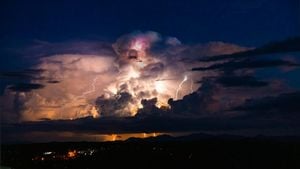Hezbollah's military actions escalated on the morning of November 24, 2024, when the militant group fired approximately 200 rockets, along with drone strikes, targeting northern and central Israel. This assault came amid heightened tensions as Israel prepared for its own airstrikes against Beirut, prompting fears of broader conflict between the two factions.
According to the Israeli military, these attacks aimed at cities such as Haifa and affected several regions across the northern border. Some of the targeted rockets managed to breach Israel's aerial defense systems, leading to at least eight injuries reported by mid-afternoon. Among the wounded was a man treated for serious injuries near Kfar Blum, closely adjacent to the Lebanon-Israel boundary.
The aftermath of the Hezbollah bombings saw significant damage inflicted on infrastructure, including the evacuation of a five-story residential building in Haifa due to structural concerns after being struck by projectiles. Reports indicated additional destruction across cities like Kiryat Shmona and Ma’alot, with emergency services moving swiftly to assess the aftermath.
Hezbollah took responsibility for these attacks as retaliation for Israel's recent military strikes on Beirut, which had resulted in casualties and considerable damage there. The group claimed its missiles and drones successfully targeted military positions, asserting, "the operation achieved its goals," though specifics on casualties or direct impacts remained undisclosed.
This latest wave of hostilities is not isolated; for weeks, the region has witnessed increasing violence. Many of the engagements spotlight the longstanding and complex animosity between Hezbollah and Israel, fueled by historic grievances, territorial disputes, and persistent military antagonisms.
Prior to Sunday’s rocket launch, Israel had executed several airstrikes against Iranian-linked facilities and groups operating out of Lebanon. Reports from Lebanon’s Health Ministry stated at least 20 individuals had died and over 66 were injured during Israel's bombing campaigns on Beirut just the day before, ramping up fears of escalation.
Compounding the situation, violent clashes had erupted early Sunday between Hezbollah militants and Israeli forces, particularly within the southeastern Lebanese town of Khiam, where Israeli troops reportedly demolished about 18 structures, igniting outrage on the Lebanese side. Military sources disclosed exchanges of gunfire and increasing hostilities along the border, making the prospect of de-escalation increasingly tenuous.
On the other hand, Israeli forces have mobilized additional troops and conducted multiple air raids targeting Hezbollah positions, highlighting the preparation for potential ground operations across their northern frontier. The trend indicates broader political arson and rising tensions as both factions prepare themselves for extended engagements.
Experts and analysts reflecting on this situation warn of the risks associated with the kinetic nature of the conflict. The intertwining agendas of Iran-backed Hezbollah and Israel's military directives evoke concerns about wider regional instability, especially considering both factions' multiple interests and alliances across the Middle East.
Regional power plays intertwining Iran, Syria, and Lebanon highlight concerns of intensified confrontations tied to geopolitical strategies. Analysts believe both sides may calculate their military responses, possibly aiming for toying with escalation without tipping the scale to outright war, but the unpredictable nature of warfare could lead to far-reaching consequences.
Families have been displaced and community infrastructures battered as the conflict intensifies. Evacuations from vulnerable areas, such as homes and schools, out of fear for safety have become commonplace amid the uncertainty of continued attacks. Reactions from the international community, including calls for ceasefire and peace negotiations, appear distant as animosities rage on.
Moving forward, tensions remain high, with both Hezbollah and Israel poised for additional military actions. The potential for resolution appears slim as both groups continue to engage militarily, triggering urgent calls for diplomatic interventions to restore calm before the situation escalates beyond control.



